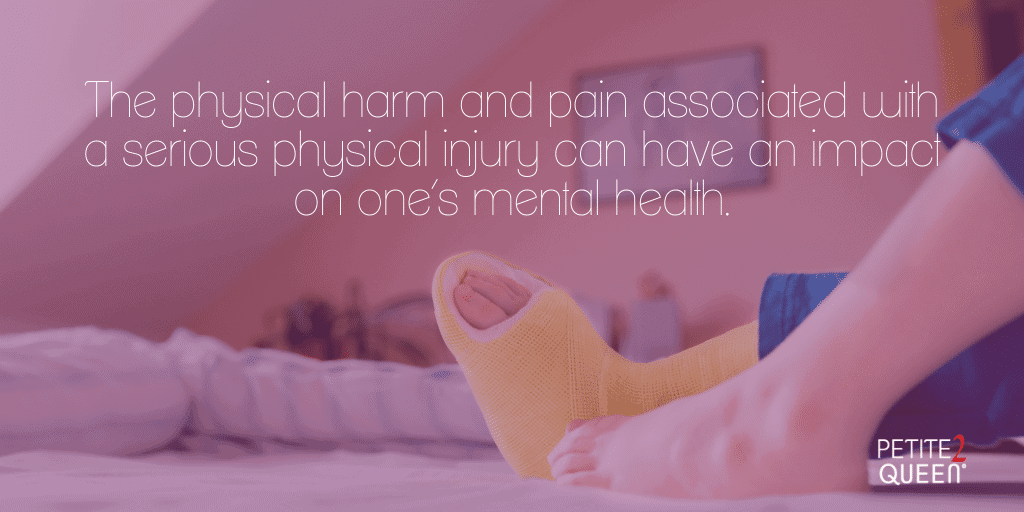I broke my leg really badly when I was in Spain doing my master’s program. I had to get surgery and now sport 7 screws and a plate in my leg. When I first started my recovery process, I only focused on two things: being able to walk again and finishing my master’s thesis. In the beginning, it was really difficult to even get dressed in the morning and take showers. Thankfully, my mom flew out to Valencia. She helped me find a different flat with an elevator and a large shower that could fit a chair. At that point, my mind only focused on being able to do basic things and dealing with taking my meds to numb the pain. Soon after that, I started going to physical therapy every day, bringing my notebook with me and working on my master’s thesis.
During all of this focus on recovery and getting my work done, I started feeling lonely and frustrated. It was difficult to get around, so I couldn’t really go out and have fun with my friends, or play in the band I had been playing with. Eventually, I was able to get around on crutches and go out with my friends again. When I graduated, I made it a point to hobble across the stage with no crutches.
When I flew back to the US, that’s when my anxiety and depression hit, badly. I had just been through a major ordeal with my broken leg, was experiencing reverse culture shock, and I didn’t know what I was going to do next, among other factors. I was still walking on one crutch, so I went to physical therapy to help gain more muscle in my leg. The problem with that was that I was depressed, so I lacked motivation to do my exercises. It was sort of a catch-22 because my leg issues were probably part of my depression, and doing those exercises probably would have helped. I finally found my personal solution through therapy, medication, mindful breathing, yoga, and exercise. With these, I was able to focus a bit more on strengthening my leg.
When I think back at what I had to go through, I see myself as being extremely strong and able to withstand a lot. I accomplished my goal of getting my master’s even with a broken leg, and I’m proud of myself for that!
The Link Between Injuries and Depression
Around 16 million Americans every year suffer from depression, with 32.5 years old as the median age of onset. Depression is the leading cause of disability in the United States.
Everyone feels down once in a while and may even have bouts of depressive moods. However, depression is a more persistent experience of lack of energy, negative thoughts, and a desolate outlook in life. Someone who has felt sad and miserable most of the time for more than two weeks and/or has had some of the following signs and symptoms might be depressed. It is best to consult with a psychologist or a psychiatrist to have an accurate diagnosis.
- Anxiety and restlessness
- Extreme irritability over minor things
- Loss of interest in favorite activities
- Insomnia or sleeping too much
- Unexplained pains
- Incapacitating fatigue
- Fixation on events or things in the past that have gone wrong
- Anger management problems
- Suicidal thoughts
Depression has been attributed to many factors over the years of research on the disorder. Past physical, sexual, or emotional abuse can be a factor. There are also certain medications that can increase the risk of depression. Sadness or grief over the death of a loved one can be a factor, as well as major events such as starting a new job, losing a job, getting divorced, getting married or retiring. Genetics can also play a part; a family history of depression may increase the risk of having depression eventually. Other factors include serious illnesses and substance abuse.
But can physical injuries cause depression, too?
The physical harm and pain associated with a serious physical injury can have an impact on one’s mental health. The emotional trauma from an abrupt and severe injury, resulting from events such as a car accident, assault, or an accidental fall, can increase the risk of a person to develop mental disorders such as anxiety disorder, post-traumatic stress disorder (PTSD), and depression.
Most people have sound mental health after recovering from a serious physical injury. However, for some people, a sudden injury can have a huge impact on their mental health and well-being, possibly because the injury has caused their life to be harder. It may be more challenging to get around, develop or maintain relationships, find employment, go back to sports, and participate in leisure activities.
What can you do?
If you have suffered a severe physical injury and think that you may have developed depression, the following advice might be helpful:
- Discuss your situation with your doctor. There are many practitioners and mental health services that can assist you with your concerns; among them are general practitioners, psychologists, psychiatrists, mental health nurses, and social workers and occupational therapists in mental health. These people can help you get a proper diagnosis and acquire the treatment that is best for you.
- It will help to have a family member or a friend to come with you to these appointments. They may benefit from knowing more about your condition.
- Accept help and support from others.
- Be honest with yourself and acknowledge that you have been through a traumatic experience; and when you are ready, talk about your experience. It can also help to reach out to peer support groups.
A portion of this article originally appeared on the Hogan Injury blog. Please see the original publication here.
Petite2Queen provides virtual mentoring to young women in life, at work, and in sales. Follow us for more practical advice you can put to use to improve your life and career.

Alison Rollins is Vice President of Marketing at Petite2Queen. She earned her master’s degree in Global Entertainment & Music Business from Berklee College of Music. An experienced marketer, Alison is an expert leader in social and digital media. She’s a talented videographer, with an extensive portfolio of thought-provoking work. At Petite2Queen, Alison focuses on meeting the diverse needs of women at all stages of their lives.


